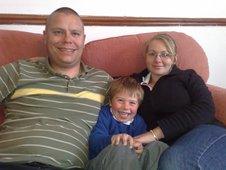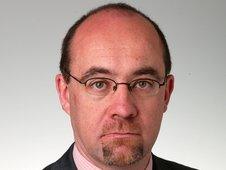Food 'crisis' hits young families
- Published

Chris Hamilton and his family have been forced to use food handouts
There's been a a big increase in the number of people relying on charity food parcels to feed themselves and their families.
That's according to the Trussell Trust which runs the UK's only national network of food banks.
It says in the last financial year it's fed 24,000 people. That's up from 14,000 the year before.
The Salisbury-based organisation says delays to benefit payments for the growing number of newly redundant workers are behind much of the 71% rise.
Money worries
Chris Hamilton turned to the food bank after losing his job as a cleaning company supervisor.
The 27-year-old father from Salisbury told Newsbeat: "In February I was made redundant from the company I was working for.
"I very quickly applied for all the necessary benefits I was entitled to, but found it would take a lot longer than I had been hoping for, or had been advised."
Chris said very soon he and his partner April Collins, 23, began to worry about paying their bills and putting food on the table for their five-year-old son William.
Chris said: "It came to a point where we were not living on any money at all. We were struggling to pay our bills, our rent, and everything else.
"Our local school was very good at helping to provide meals for our son. But us ourselves were struggling very badly for household items or food."
It was then that the Citizens Advice Bureau recommended Chris and April to the food bank.
Three meals
Sipping a cup of tea in the cafe which makes up part of the Salisbury food bank, Chris explained: "We came down here and the staff gave us options on what we could have and what we could eat.
"At first it was very demoralising that we had to rely on a charity to eat. It was very scary.
"When April and I got together six years ago we said we would provide for ourselves and our family. We never thought we'd have to rely on a charity just to keep alive."
The food bank gave Chris and April a parcel with enough food inside to last them and their son three days.
The food's all tinned or dried, like pasta, so it won't go off before it's handed out.
A look through the shelves in the food bank's storeroom reveals cans of soup, tinned fruit and vegetables, boxes of cereal, UHT milk, and many, many tins of beans.
Usually people are referred to the charity by doctors, social workers or other bodies such as the Citizens Advice Bureau.
A voucher is issued which can be exchanged for food for one or more people depending on their need.
Chris said: "Although it was demoralising in some senses, when the food bank started packing the food for us we realised we could cook decent food and survive for a couple of weeks. We are so grateful.
"It's not our fault. We just haven't got the money to pay normal bills."
But Chris said that he couldn't get his benefits quickly enough.
By the time they began to be paid, he said he'd built up debts on ordinary bills that he just can't get on top of.
National problem
Previously the food banks would provide help mostly to people facing relationship break-ups, or to others with drink and drug problems.
But now, tales like that of Chris and April are increasingly familiar to the director of the Trussells Trust, Chris Mould.
He explained: "What's changed recently is the increasing number of people who've come to food banks, right across the country, because they've lost their jobs and they're struggling to get the state system of welfare support working for them.
"There are long delays. And people are left bereft of any kind of finance."

The government denies there's a problem with the benefits system
The Government denies there's a problem with the benefit system.
But employment Minister Jim Knight said he'd listened to groups like the Trussells Trust.
"It would surprise me if there are new delays because that's not what the data shows me sat in the privileged position in my office," he said.
"But obviously I'm keen to hear what's going on on the ground and if people are saying in certain parts of the country there are problems, or that there's a general problem that our data not picking up, then obviously I want to hear about that."
There are now 41 food banks across Britain and the charity has ambitions to set up one in every town.
- Published16 July 2009
- Published15 July 2009
- Published15 July 2009
- Published15 July 2009